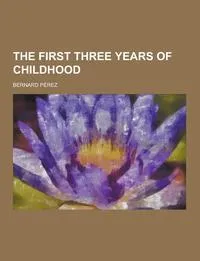The First Three Years of Childhood
Автор: Bernard Perez
Переплёт: Мягкая обложка
🔖 Este libro historico puede tener numerosos errores tipograficos y texto faltante. Los compradores pueden descargar una copia gratuita escaneada del libro original (sin errores tipograficos) desde la editorial. No indexado. No se muestra. 1885 edition. Extracto: ...they exercise it still more during their sleep. This is in my mind the most favorable time for the intellectual labor of little children, labor which must be frequent and peaceful, and whose value is almost always in direct ratio to the apparent repose of the exterior organs. It is then that those hallucinatory sensations without any present or definite object, those vivid reminiscences, those countless associations--flashes of abstraction and generalization--those collocations verging on comparison, those objective judgments and reasonings, resuscitate, under the more or less open eye of consciousness, in the fibres of the brain, charged as they are with recent impressions and along which the blood ebbs and flows rapidly, awakening incessantly the vitality which is scarcely affected by the paralysis of slumber. Let us study the transition from reproductive to productive imagination, which is also called poetic or creative. As soon as ideas no longer present themselves in the order in which the intelligence has first perceived them, as soon as something has become altered--were it only one link suppressed in a series of associated images--there may be said to have taken place an artificial mental composition, a modified conception of reality, a spontaneous work of productive imagination. These free combinations of images arise spontaneously in young children; and is it not often the same with adults, who are visited by so many unexpected inspirations? The little Tiedemann, when five months old, "guessed," his father says, when he was going to be taken out, and showed signs of delight. His biographer sees no more in this than an association of ideas; but there is more in it. Mixed up with the act of...
Мнения
